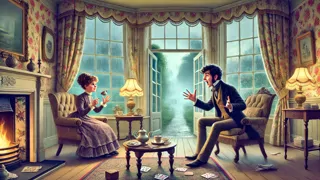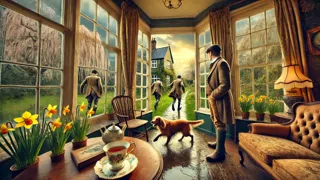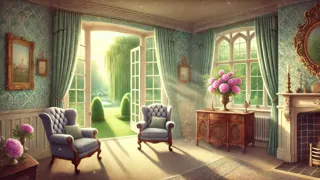Introduction
Among the drowsy lanes and gentle undulations of Surrey’s countryside, time seems to hesitate—as if even the sunlight considers whether to linger or pass on by. In the April of 1882, when wildflowers slouched in the green meadows and distant ploughmen’s voices floated like the first notes of a lullaby, Reginald Framton arrived at the house of the Sappletons. He was a man born with more nerves than sense, the type who flinched at the buzz of a bee, who could find an ominous sign in the stoop of a hedgehog, and who, above all, needed rest. London, he thought, had turned him into a whirring top, wound too tightly by the noise of omnibuses and endless gossip. He’d sought the Sappleton house for tranquility, for unrelenting peace, for a cure to his nervous spirit—a place where, perhaps, even one’s shadow might stretch out and sigh contentedly beside a sunlit garden bed.
The Sappletons’ home, a grand manor wreathed in climbing ivy, seemed to hum with the promise of gentle quiet. The glass of the long French windows, glistening from the morning’s damp, framed a vista of spreading lawns, tilting willows, and the faintest swish of distant river reeds. Inside, the sitting room was a museum of comfort: armchairs so inviting they threatened to anaesthetize, a clock that ticked so agreeably it was one’s heartbeat’s companion, and, most notably, the aforementioned window—wide open as if in anticipation of something not yet arrived. There was neither dust nor iceberg chill in the gentle air, only the perfume of peonies coiled around the promise of afternoon tea.
Little did Reginald know, as he nervously fingered the brim of his traveling cap, that the greatest commotion in this house would arrive not with the wind nor a dog’s bark, but with the imagination of a certain fifteen-year-old Vera. Vera, vivid-eyed and inveterately mischievous, regarded the open window as a blank stage upon which to cast her dazzling improvisations. For Reginald, whose nerves could barely wrestle a teapot into pouring, the Sappleton home was not the sanctuary he’d imagined. It was to be a crucible—the sort that tests the bounds of credulity, transforms the most trivial incident into legend, and leaves everyone except, perhaps, the poor victim, laughing behind embroidered handkerchiefs.
Arrival with Frayed Nerves
Rain threatened the afternoon as Reginald Framton stepped from his cab into a world awash in robin’s egg blue and the gentle susurration of wind through new leaves. Mrs. Sappleton’s residence, all gables and brambly charm, sat at the lane’s end—a manor neither ostentatious nor cold, but with a certain familial warmth. He took a moment, steadying himself; a journey by rail always left him feeling as if some part of his spirit were still clinging to a handkerchief on the platform. The butler, Harsley, offered the serenity of a practiced smile and ushered him within.

Reginald’s host was nowhere to be seen, but Mrs. Sappleton’s niece Vera awaited him in the sitting room. She stood with a poise both innocent and calculating, her eyes a shade too knowing for her age. The two exchanged polite greetings. The quiet tick of the grandfather clock, punctuated by the distant sound of a lawnmower, underscored the gentle awkwardness of their small talk. Vera, sensing her guest’s skittishness, decided mischief should be her answer to a lazy afternoon and a dull-lidded visitor.
“Do you mind the open window, Mr. Framton?” Vera asked, her expression grave. “It’s rather a fixture of our household.” Reginald gave the window, thrown wide to the garden, a nervous glance. "Not at all, though it does let in a bit of a draught."
She seated herself opposite, smoothing her skirt, then leaned forward confidentially. “You see, three years ago, my aunt’s husband and her two brothers went out shooting partridges through that very window. They've never returned. Every evening the window is kept open for them, in the hope that they’ll one day walk back across the lawn, just as they left—with their spaniel trotting ahead and their boots muddied at the hem. My aunt insists on it.”
Reginald felt his throat tighten, as if someone had drawn the laces on his stiff collar a bit tighter. “How terrible,” he murmured. “Disappeared...just like that?” Vera nodded gravely. "The bog by the river, you know—it’s treacherous. They say the mists can swallow up the unwary." Hearing this, Reginald’s gaze flickered insistently toward the glass, his mind already conjuring images of spectral hunters emerging from the swirling green. Vera, for her part, rather enjoyed the pallor that crept upon her guest’s cheeks.
Mrs. Sappleton finally entered the room, dressed in a manner wholly improper for tragedy: an apron covered in flour, cheeks flushed from the kitchen. She greeted Reginald with warm, bustling hospitality, hardly a word for the supposed grief Vera had painted. “You’ll forgive me for the rush,” she said, “the scones will not roll themselves.”
She fussed about the open window, adjusting a velvet cushion on the settee. “My husband and brothers will be in soon from their shoot—dreadfully muddy business this time of year!” she exclaimed.
Reginald’s teacup rattled against its saucer. He looked to Vera for guidance, but she was studying the garden with feigned interest, barely hiding a sly smile. The clock ticked, and with every passing second the drama only deepened in Reginald’s mind. The scene outside the window—a garden path gently curving through daffodil beds—now seemed the edge where a terrible reunion might unfold at any moment. He sipped his tea, hoping it would fortify rather than unnerve him further.
Mischief with a View
There’s a peculiar tension in country houses between their stillness and the occasional storm of mischief, and that afternoon, Vera guided the latter as an artist handles a brush. Lunch passed with little event, apart from a scone that catapulted jam toward Reginald’s best trousers—thankfully intercepted by a napkin. Afterward, in the warm haze of midday, Vera suggested cards by the window. Rain beat softly against the panes, and the garden was momentarily veiled by a gentle drizzle, blurring any clear view beyond the patio.

Between shuffles and small talk, Vera embellished her earlier story. She noted with theatrical sadness how Mrs. Sappleton never quite recovered her "peculiar hope," setting out sandwiches for men more imagined than real, always insisting the scent of gunpowder lingered on the sill. Reginald made sympathetic noises, eyes frequently darting to the window’s yawning mouth.
Suddenly, in the midst of a hand of whist, Mrs. Sappleton exclaimed, “They do take such ages! I always say, these men and their rambles—if they’re not lost, they’re knee-deep in bog.” She arranged the tea tray with a brisk cheeriness that Reginald found perversely chilling, as if she’d perfected the art of smiling at the abyss.
Vera, languidly waving a card, darkened her tone. “Aunt is terribly brave. You know, she refuses to believe they’ll never return.” She gazed mournfully into her lap. “Sometimes, on the gloaming, I see her watching that path, just in case.”
Thunder rumbled softly in the west. The garden’s trees, glossy from rain, bent in the wind, their leaves rustling like distant footfalls. Reginald fidgeted, unsure if the shiver prickling his spine was from the weather or Vera’s growing embroidery of sorrowful details. Vera jabbed at his nerves again. “I sometimes imagine them walking up the lawn—their spaniel’s bark echoing, as it always did. I suppose I listen too hard sometimes.”
A stray branch knocked against the pane, and Reginald jolted, upsetting the cards. Mrs. Sappleton apologized for the draft, but Reginald could hardly focus: all his attention was absorbed by the hypnotic pull of the garden, the open portal awaiting spectral returnees. Even the cake tasted faintly funereal, or so he thought—consumed as he was by the suggestion of impending visitation.
The room’s atmosphere thickened, layered with the scent of rain and the echo of youthful invention. Vera’s every word was bait, skillfully cast. In swooped Mrs. Sappleton: “Do keep an eye out, my dear—I'm sure you’ll see their boots soon!”
Reginald barely managed a shaky smile, wondering whether this ill-fitting farce wasn’t some peculiar English tradition: to unsettle one’s guest with a parade of bruised hearts and open windows. If so, he wished heartily for the return of sterile city conversation, where ghosts knew their place and laughter had the decency to be unmysterious.
The Return and the Retreat
Reginald’s nerves were stretched as tightly as the strings of the piano on which Vera absently tapped a melody. The window stood, as always, yawning to the garden, its curtains shifting with the breeze. Evening settled over the lawn in shadows, while a golden haze filtered through the clouds, softening the hard contours of hedgerows and the willow’s mournful reach.

The gate at the bottom of the garden creaked with a gust of wind. Reginald, engrossed in a discussion of mineral springs, froze. Mrs. Sappleton, who was rearranging the couscous on a silver platter, sprang to attention. Her voice brightened, “There they are at last!”
Reginald’s grip on his teacup slackened. Through the open window, down the curved path between clumps of sodden daffodils, three figures approached. They wore shooting jackets, wellington boots caked with mud and—most chillingly—a tan spaniel loped beside them, tongue out. The scene was so precisely as Vera had described that even the spaniel’s bouncy gait seemed a detail crafted to torment him.
He fumbled to his feet. His mind reeled; Mrs. Sappleton continued serenely: "Just look at the mud! I’ve told them—if they ruin my carpets again—" Reginald couldn’t hear more. The blood pounded in his ears. The garden, the approaching men, the spaniel’s happy bark—it was all too much.
With a strangled cry that could have been mistaken for a sneeze or a plea, Reginald bolted. He leapt from his chair, upending a plate of sandwiches, and dashed through the vestibule, hat tumbling from his hand, barely pausing to snatch his walking stick from its stand.
He was gone—out the front door, down the wisteria-shaded lane—before Mrs. Sappleton could protest. The three men, now entering the sitting room, exchanged puzzled glances. “Who was that peculiar chap?” asked Mr. Sappleton, brushing damp from his coat. The spaniel padded in, tail wagging, utterly untroubled by the dramatic departure.
Vera, face angelic, replied lightly, “Oh, that was Mr. Framton. He’s terribly afraid of dogs. Once, in India, he was hunted out of a walled city by a pack of stray curs. He never quite got over it.”
There followed a burst of laughter from the grown-ups, who marveled at the tale’s absurdity. Mr. Sappleton scratched the spaniel’s ear. “City visitors,” he said with a wink. “What can you do but give them tea, and, sometimes, a story?”
Vera poured herself another cup, gazed out the open window, and waited for the next worthy victim of her wild invention.
Conclusion
Reginald Framton’s visit to the Sappletons became the stuff of legend in his own mind—an episode recounted to doctors, friends, and distant relations, always with a shudder and a wary glance toward any window left open. Though the countryside’s tonic was thought to calm weary nerves, for Reginald it offered a different cure: a bracing first-hand lesson in the power of belief and the hazards of a fertile imagination. Over time, the tale rippled through the lanes of Surrey, gathering embellishments like seeds on a breeze. Vera, perched at the window, remained the architect of rural legend, her wit as sharp as ever, her face an inscrutable mask of innocence. Sometimes, on misty afternoons, the laughter of grown-ups spilled into the garden, mixing with the clangor of tea service and the joyful bark of the spaniel, reminders that stories—like fresh air—travel best when the window is wide open. And so the manor’s open window carried not tragedy, but echoes of clever mischief and a reminder that, in the English countryside, even rest can bend into farce when met with the nimble imagination of a bored fifteen-year-old.

















